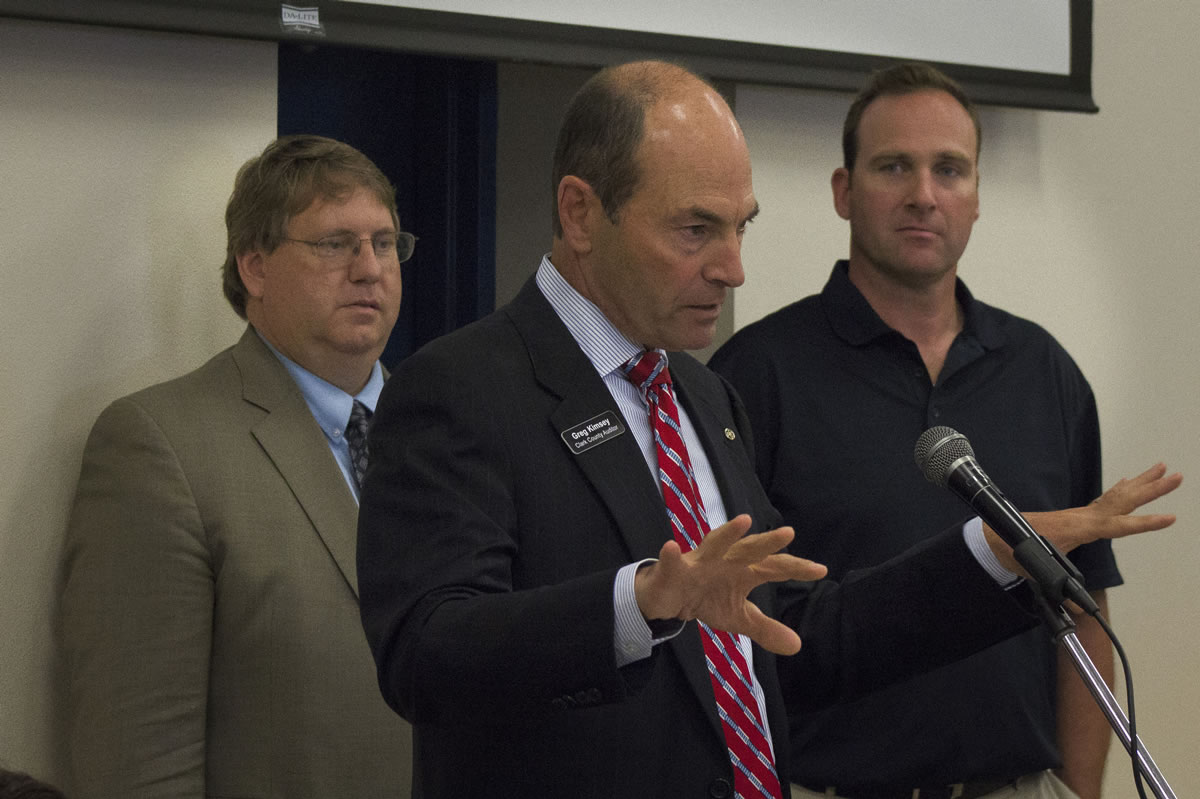Clark County Assessor Peter Van Nortwick stood beside Auditor Greg Kimsey and Commissioner Steve Stuart Wednesday afternoon at the Hazel Dell/Salmon Creek Business Association to discuss a potential home rule charter in Clark County.
Van Nortwick, a Republican, says he agrees with much of the charter framework that Kimsey, a Republican, and Stuart, a Democrat, are pitching to voters through the political action committee Team ClarkForward. But he’s not joining up with the political action committee to stump for the cause.
“That is Steve Stuart and Greg Kimsey,” Van Nortwick said after the meeting. “I support a county executive model. I support that form of government, but I don’t want to be the one driving it. The bottom line is the people need to decide.”
Home rule allows voters to change local government in the manner they see fit, as long as it falls within the laws of the state and abides by the U.S. Constitution.
The commissioners have approved undertaking the process, and authorized the November election of 15 nonpartisan freeholder positions. The freeholders will then draft a proposed county charter, and return it to voters for final approval.
Team ClarkForward, which Kimsey and Stuart formed, is pitching for a new county government modeled heavily after the one implemented in Snohomish County in 1980.
One key change championed by the group includes the election of a county executive in an effort to separate the executive and legislative powers currently held by the board of commissioners.
That’s the part of the plan Van Nortwick particularly likes, and on Wednesday he told the group of 40 in attendance that he agreed with that method of governing.
“An elected executive is vital moving forward,” Van Nortwick said. “Appointed positions have a lot of power. That power should rest with the people.”
Van Nortwick’s other message to the group was that the county taxing system is not up for change in the coming charter discussion.
“We still have the 1 percent rule (on property tax increases authorized by county commissioners),” Van Nortwick said. “That remains in effect.”
Van Nortwick said he is happy to speak to any group that requests his presence, as Kimsey and Stuart did. He joined the bipartisan duo once before for an informational event, and he spoke to fellow Republicans at a charter-related information event hosted by the local chapter of the Republican Party.
Still, his view on the county executive puts him firmly in one camp on the matter as commissioners David Madore and Tom Mielke, both Republicans, have made it clear they believe the county executive approach puts too much power in the hands of one individual.
Kimsey responded to that claim Wednesday, saying the move should instead be viewed as a way to create “checks and balances” within local government by separating the powers currently enjoyed by a commissioner board of three.
Legislative talk
While it was the discussion on a county charter that drew the most questions of the day, the business association’s luncheon also held a quick forum with state Sens. Annette Cleveland, D-Vancouver, and Ann Rivers, R-La Center.
Both senators shared their successes and failures during the 2013 legislative session.
Cleveland said she was lamenting the loss of a transportation package, which would have included $450 million in funding for the Columbia River Crossing. Failing to pass the package essentially killed the project, which would have replaced the Interstate 5 Bridge.
Rivers said she regretted the length of the special sessions needed to complete a state operating budget. Lawmakers extended a normally 105-day session into a series of sessions lasting 153 days.
But that is largely where the differences in speeches ended as the two said they shared in many of the Senate’s successes.
Education funding, which was increased by about $1 billion in the approved budget, is a triumph for both senators.
“That was really our biggest challenge this session,” Cleveland said as Rivers nodded.
The two also celebrated the passage of a bill allowing smaller movie theaters to serve alcohol, which will benefit Kiggins Theatre in downtown Vancouver.
Rivers said the cooperation between her and Cleveland is an indication that they had both worked hard to help Southwest Washington by improving education funding, focusing on job growth and crafting a sustainable budget.
“You had to let go of those things we just can’t agree on,” Rivers said. “That’s what Annette and I did. That’s why we were so effective to take care of Southwest Washington.”



